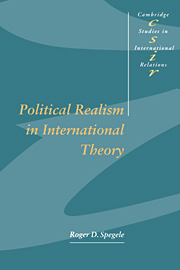Book contents
- Frontmatter
- Contents
- Preface
- Acknowledgements
- Part 1
- Part 2
- 4 Evaluative political realism: a beginning
- 5 State and state-systems in evaluative political realism
- 6 Evaluative political realism and human nature
- 7 Evaluative political realism and historical realism
- 8 Evaluative political realism as moral realism
- 9 Conclusion
- Notes
- Bibliography
- Index
- CAMBRIDGE STUDIES IN INTERNATIONAL RELATIONS
8 - Evaluative political realism as moral realism
from Part 2
Published online by Cambridge University Press: 30 October 2009
- Frontmatter
- Contents
- Preface
- Acknowledgements
- Part 1
- Part 2
- 4 Evaluative political realism: a beginning
- 5 State and state-systems in evaluative political realism
- 6 Evaluative political realism and human nature
- 7 Evaluative political realism and historical realism
- 8 Evaluative political realism as moral realism
- 9 Conclusion
- Notes
- Bibliography
- Index
- CAMBRIDGE STUDIES IN INTERNATIONAL RELATIONS
Summary
And unawares Morality expires.
Alexander PopeIntroduction In the nineteenth century, scholars, practitioners, students and interested citizens construed the subject of international relations as paradigmatically bound up with morality and ethics. But with the rise of logical positivism and logical empiricism in the philosophy of science and some associated doctrines, many people apparently became convinced that the intimate connection between morality and the study of international politics constituted an obstacle to a scientifically valid understanding of the subject. Support for their rigid separation was to be found in the dominant epistemology of the time which contrasted the kind of knowledge said to be available in scientific inquiries with that to be found in ethics in such a way as to depreciate ethics, or to make it, at best, a ‘special’ study outside the purview of mainstream ‘empirical’ international relations. The implications of this view may be gleaned from a passage in a well-known text in international relations written in the 1960s:
Science and scientific words relate to only one kind of knowledge, and not to any other kinds of knowledge that may exist. They do not relate to alleged knowledge of the normative - knowledge of what ought to be. Science concerns what has been, is, or will be regardless of the ‘oughts’ of the situation.
If ‘science’ is the domain of ‘what has been, is, or will be’ and morality consists of ‘what one ought to do’ where the sort of knowledge involved is ‘alleged’, prima facie that would seem to leave morality with hardly anything to do.
- Type
- Chapter
- Information
- Political Realism in International Theory , pp. 191 - 229Publisher: Cambridge University PressPrint publication year: 1996
- 1
- Cited by

